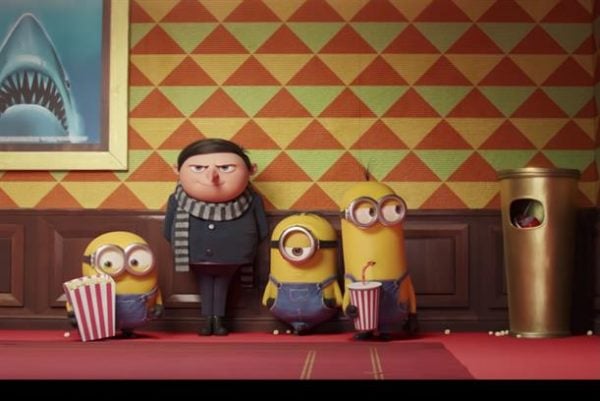
By Ruby Ktori, creative strategist, Amplify
This month, Minions: Rise of Gru hit the box office, raking in more than $125m in ticket sales, obliterating previous records for Fourth of July releases – and its creators have Gen Z to thank for its success, with a surprising 34% of viewers landing in the 13- to 17-year-old age bracket, compared with just 8% in 2017. Huge for a kids movie.
These impressive numbers can be attributed to a viral Minions trend on TikTok, dubbed Gentleminions. The trend involves groups of friends attending screenings of Rise of Gru dressed in formalwear and acting very gentlemanly to the sound of Yeat’s song Rich Minion, with the most viral iterations of the trend garnering upwards of 36 million views each and counting.
But how did this become “a thing”? Of course, many Gen Z-ers were children when the Despicable Me movies first came out, so there’s history there. The relationship is reminiscent of what Shrek was to millennials – and we’ve all seen “Shrek is love”, right? Anyway, I digress.
When you combine the deep-seated emotional connection that Gen Z-ers have with Minions with Universal’s eccentric marketing strategy, that’s when the cogs start to turn.
For years, Minions have been securing media placements you wouldn’t exactly expect – from limited-edition Tic Tacs, tampons and onigiri seasoning to Liberty Mutual ads and bags of salad.
It’s this self-referential randomness and meme-ability that planted the seed for a wider cultural moment that would penetrate and permeate online conversation, ultimately inspiring masses of earned media, and landing substantial bottom-line impact for the Minions franchise.
But, as to be expected with the internet, as online buzz for Gentleminions ramped up, things rapidly descended into chaos, culminating in mosh pits forming at screenings and police being called to subdue rowdy crowds.
Some cinemas banned formal wear from the building to control the phenomenon. But the Gentleminions can’t be stopped, taking changes of clothes to put their suits on under the cover of darkness once the movie begins.
It’s not the first time we’ve seen an internet trend get out of hand. The #cratechallenge (now completely blocked from the TikTok search bar for safety reasons) started as a wholesome pandemic activity, and resulted in dislocated shoulders, broken wrists and even spinal cord injuries when people pushed the limits of their own personal safety for the sake of securing that viral video.
There comes a point in every internet trend where the wheel breaks. This is because online creators are competing in a declining attention economy, and in this space, each iteration of a trend has to be more disruptive, extreme or controversial than the last to cut through.
It’s birthed a new era of internet culture, spearheaded by this insatiable thirst for the currency that is the attention of strangers on the internet, resulting in increasingly rapid and fleeting trend cycles from fashion and interior design, through to entertainment and memes.
With bureaucracy and lofty approval ladders, it’s no surprise that most brands and businesses haven’t quite found their stride when it comes to engaging in internet culture.
The Gentleminions trend, though disruptive, also brought with it ample opportunity for cinemas to win cultural capital while monetising the movement.
An enterprising business would have deployed a reactive experiential strategy, running suit-only screenings of Rise of Gru, complete with other gentlemanly and immersive experience touchpoints.
Times like these show us that now, more than ever, agility, creativity and appetite for risk are vital for businesses when it comes to making the most of these earned media opportunities.
We’ve seen the mass adoption of meme culture exist since the mid-2000s (Harlem Shake, ALS Ice Bucket Challenge, Cinnamon Challenge) but Gen Z meme culture is fundamentally different from anything we’ve seen before.
This audience is chronically online, living and breathing internet culture. They have the technology and the tools to achieve that blurred delineation between their IRL existence and the online contexts and communities they interact with everyday. For Gen Z, a meme isn’t “a thing”, it’s just life. Everything is a meme.
Gen Z is anarchic and chaotic with a post-ironic sense of humour that creates a funhouse infinity mirror of layered parody. They’re sceptical of institutions, and most brands and businesses are failing at engaging with their culture, because their forays into viral trends aren’t adding anything to the conversation, and they are quite simply too slow on the uptake.
In an era where social media can break box-office records and sell out shelves, it’s time for brands to take a leaf out of the Minions book.
To connect with Gen Z and achieve reach on the internet, the first step is to take time to figure out your identity and your point of view within the space, and then lean into it. Unapologetically.
Digitally native audiences are fickle and, ultimately, they are going to do what they want, so seeing long-term brand lift from social media cannot just come from the content you serve them – even if it does have viral appeal.
Meaningful success through social is achieved when you play the long game. Now more than ever, brands and institutions need to become fluent in internet culture, speak it with consistency, and integrate this language into wider brand planning.
Social was once a sea of quick wins and low hanging fruit, but nailing how your brand shows up on the internet is now more complex and nuanced than before.
The success that Rise of Gru enjoyed, with social as its vehicle, demonstrates the power that community and earned media can have. The internet isn’t going anywhere, nor is the culture that comes with it. So now, more than ever, it’s important to give social a real seat at the table.
Ruby Ktori is a creative strategist at Amplify, a UK-based agency.
Source: Campaign UK









